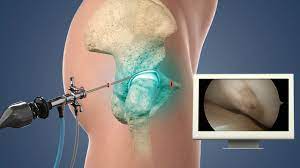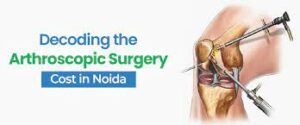Contraindications
- Hip arthroscopy is contraindicated in the presence of ankylosis or advanced arthrofibrosis.
- Soft tissue compromise, whether from disease, trauma or previous surgery, may contraindicate the passage of instruments into the hip joint. Similarly, bony compromise, either of the joint architecture or potential stress risers, regardless of the cause, may contraindicate application of the distraction forces necessary for hip arthroscopy.

- For hip arthroscopy, extra length instruments are usually necessary, even for moderate sized patients. Consequently, severe obesity may be a relative contraindication to arthroscopic intervention.
- Advanced disease states with destruction of the hip joint also contraindicate arthroscopy as there can be no reasonable expectation of symptomatic improvement.
Operative Technique
Hip arthroscopy is performed as an outpatient procedure and usually under general anesthesia. Epidural anesthesia is an appropriate alternative but requires an adequate motor block to ensure muscle relaxation.

Patient Positioning:
Hip arthroscopy can be performed with the patient in either of the following positions:
Supine: The patient is positioned supine on a modified fracture table. An oversized, formed urethane peroneal post is used.
Lateral Decubitus: Lateralized to the operative side. Lateralizing the peroneal post adds a slight transverse component to the direction of the traction vector.
Risk and complications related to Hip Arthroscopy
- Infection: A small number of people can develop an infection with a total hip replacement. This complication can require further surgery to remove the prosthetic components and clean out the joint along with a course of antibiotics lasting six to eight weeks.
Read more – https://blog.docopd.com/category/hip-arthroscopy
- Deep venous thrombosis (DVT): A blood clot(thrombosis) may form in veins of patient’s pelvis, thigh, or leg. After surgery, patient will receive blood-thinning medication, such as aspirin or warfarin (Coumadin), to prevent clots from forming.
- Pulmonary embolism(PE): An embolism occurs when a clot breaks free and travels to patient’s lungs. An embolism potentially can cause serious respiratory difficulty. The risk of having one is less than 1%.
- Bleeding: As with any surgery patient will experience bleeding both during and after the procedure. Patient often will need a blood transfusion.
- Nerve injury: Patient has a small risk of injuring the nerves that allow sensation and movement of the leg. Often this problem, if it occurs, will go away over time.
- Anesthesia: Any type of anesthesia has risks associated with it. Discuss these with consultant doctor.
- Fracture: Other bones may be broken during surgery. These breaks may affect patient’s rehabilitation and require a longer hospital stay.
- Dislocation: Patient’s new hip will not move as well as a normal joint and thus can be dislocated more easily. Patients must be taken cautious not to sit too low or to cross legs.
Cost of Hip Arthroscopy
Cost of Hip Arthroscopy depends upon various factors, considering age type of implant and packages offered by hospital to hospital. For Single Hip Arthroscopy cost Rs 2.0-3.0 Lac approx (with imported Johnson and Johnson or Zimmer Implant) and for Bilateral Hip Replacement Surgery cost Rs 5.0 Lac approx (with imported Johnson and Johnson or Zimmer Implant). Actual Cost of the procedure may vary depending on medical condition of the patient.

Conclusion
hip arthroscopy stands as a beacon of hope for those suffering from hip-related ailments. Its minimally invasive nature, coupled with remarkable success rates, makes it a preferred choice among patients and medical professionals alike.
Best Health Packages Information visit here :- https://www.docopd.com/en-in/lab


